
Publisher:
Bonnie King
CONTACT:
Newsroom@Salem-news.com
Advertising:
Adsales@Salem-news.com

~Truth~
~Justice~
~Peace~
TJP
Aug-19-2022 02:24


 TweetFollow @OregonNews
TweetFollow @OregonNews
The Climate Front: People Who Live There, with Attorney John Meyer
Robert Lundahl special to Salem-News.com“There's no logging project that's an economic winner for the public.” -John Meyer
 The rare tree marked to be saved among the many old growths. Courtesy: Cottonwood Environmental Law Center |
(LOS ANGELES, Calif.) - Two landmark judgments have come down that have altered perceptions about stewardship and systems thinking in Montana’s outdoor paradise.
The latter, a 2012 determination by the District Court and the Ninth Circuit, validated by the Supreme Court, limits old growth timber sales across 12 million acres, within the habitat of the Canada Lynx.
The former, spotlighting impacts to rivers and streams, from over irrigating with reclaimed “treated sewage” on golf courses and resort and housing properties, some, the playgrounds of America’s best known business leaders and celebrities.
Both are informed by a growing awareness of the new information provided by climate science on species and habitats.
As the stakes rise, Attorney John Meyer, Executive Director of the Cottonwood Environmental Law Center confides, “We won the case in the court of law, but we're learning that the court of law is not enough. You have to win the court of public opinion.”
It has been my honor to interview John, who carries responsibility as a traditional sportsman in Montana Big Sky country, the son of a hard working blue collar mom, skier, hunter, and heartfelt advocate for the land and for protection of natural systems, rivers and old growth forests.
EXCLUSIVE INTERVIEW
Robert Lundahl:
Can you introduce yourself and what your expertise is, what your non-profit does, and give us a little bit of introduction.
John Meyer:
Yes, my name is John Meyer. I am the Executive Director of Cottonwood Environmental Law Center. We are a non-profit based in Bozeman, Montana. We represent other conservation organizations as well as our own members to file lawsuits to protect clean water, healthy rivers, healthy forests.
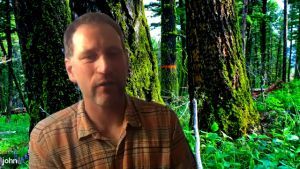 Attorney John Meyer, Executive Director, |
You were just telling me that you settled a very important case; it's a Clean Water Act case. I'd like to know more about that case and how that was disposed this week.
John Meyer:
Yeah, so Cottonwood Environmental Law Center and Gallatin Wildlife Association settled a federal clean water act case last week against a private community – it's called Spanish Peaks Resort.
That resort has a golf course and they irrigate the golf course with treated sewage, and the problem is that they're over irrigating the golf course and all that nitrogen and the treated sewage is leaching into the groundwater and then it hits the river – and when it hits the river you get algae blooms and it kills the fish and it's ugly.
It's bad for the river. And so we filed the clean water act lawsuit and the Spanish Peaks Resort has agreed to limit the amount of treated sewage it uses to irrigate the golf course as well as it's going to replace the liner in the holding ponds.
The liner and the holding ponds are ripped and all that treated sewage is leaking through the liner and also reaching the groundwater so this is a big win for clean water in southwest Montana.
Robert Lundahl:
Now how did this come down? Was this oppositional with regard to the community or did they eventually come around to seeing things your way and want to contribute to something good? What was the tone?
John Meyer:
People in the community want clean water. Everyone likes clean water. The few people that don't care are the developers, so we're always fighting in the court of public opinion because it's one thing to be right in the court of law, but it's something totally different to be right in the court of public opinion.
We're really working hard to collaborate with individuals and communities to really talk about the values that at risk here by over development in southwest Montana.
Robert Lundahl:
So then do you think that your settlement – and I'll call it a victory, your victory here will resonate in the community, and get in the papers or go beyond the immediate participants?
John Meyer:
Yeah it definitely will. We have three other clean water act cases against the other golf courses in the area, including the Yellowstone Club.
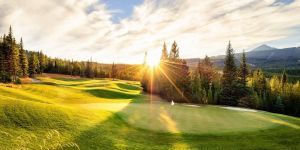 Spanish Peaks Resort7 |
They're not just over irrigating the golf course, they're also spraying their treated sewage on fields everywhere, and it's polluting our river terribly.
A lot of these folks want to protect the river, I think they just don't know what's happening because they're shielded from what's really happening by their handlers or whoever.
I don't think they really have a good feel of what's happening on the ground so that's where we're trying to really get the message to the members of the Yellowstone Club saying, “Hey we appreciate what you do, we really like the fact you care about the environment, but we need you to really step up and hold this private resort community accountable so that you're not polluting our river.
"We want you to be part of our community but in order to do that you need to be responsible and you need to be educated, and we need you to stand up with us.”
Robert Lundahl:
So it sounds like part of your mission is education, however you can achieve that, however you can provide that.
John Meyer:
Absolutely because most people in the Yellowstone Club just don't know that that the private club is over irrigating their golf course and discharging wastewater into the river.
If they knew – if these multi-millionaires knew that their club was polluting the river, they would never allow that to happen. It's just a matter of getting the message out to those folks.
Robert Lundahl:
So what do you expect in terms of follow-up, now that that case has come to a resolution?
John Meyer:
Well that's the first case. We have three others. The first case, again, was against Spanish Peaks. The case against Yellowstone Club is still open. We have another case against Boeing, which owns Big Sky ski resort. We're asking those two to limit the amount of irrigation they put on their golf course using treated sewage as well.
It's not impossible, we just showed it as possible with this last settlement so now it's a matter of asking them, "Why aren't they going to protect the river?"
Robert Lundahl:
A lot of people don't know that there's a Yellowstone Club, and that the area where you live and work has become a high-end resort destination. I recalled on the Gallatin River last time I was up there that there were big players, like Bruce Willis I think, and some others, so is this a continuing trend that it's so desirable to the high-end folks?
John Meyer:
Absolutely. There are a ton of movie stars and professional sports players who want to have vacation houses in southwest Montana.
The issue that I see our country facing is one of over consumption. Everyone talks about climate change but the problem of climate change is driven by over consumption.
If we stop consuming as much as we do, we're not going to have nearly the impacts on the climate that we're having right now – and everyone then says well we need to what are we going to do about the economy we have to continue growing the economy... jobs jobs jobs... we need to think.
We need to hit the timeout. Hit the pause button and take a timeout and talk about how we're going to restructure our economy in such a way that we're not exacerbating the impacts of climate change.
Robert Lundahl:
Do you see this as kind of breaking down according to the typical political divide or are there... I mean, in California we had generations of Republicans that were more or less moderate that played a big role in establishing green areas, greenbelt areas in the San Francisco Bay Area and beyond, so I would say that early conservationists were often conservative, so that may be a surprise to folks.
John Meyer:
There are a lot of people who tend to vote Republican that like clean water. I've not met too many people who dislike clean water.
People sometimes say “jobs versus the environment” and that is becoming more and more true to the point where we are having an environment where people can't live. People can't recreate anymore.
There are scientific studies coming out from the US EPA and other agencies saying we have fish changing sexes because of the pharmaceutical pollution in the in the treated wastewater.
So we need to stop and really think long and hard about what we want the planet to look like in 100 years, 50 years if you have kids.
We can't buy our way out of this, we have to really stop and slow down and say, “do I need this?”
A few years back I was with my wife and I told her, “Hey I really want to buy a new pair of skis,” and she said, "do you need a new pair of skis?” and it was just like a punch the right on the nose, you know, yeah, and I had to admit I don't need a new pair of skis.
I wanted a new pair of skis, but there's a huge difference between wants and needs. We need to start to develop that mentality in everything we do.
I might want a new house in Yellowstone Club. I might want a new car. I might want whatever, but do I need that? Do I really need a new vacation house in the awesome club? Do I really need a new car?
It's just a matter of wants and needs. If we're going to solve the climate crisis we really need to talk about this at an individual level, that's not to say that the government doesn't have any responsibility to step up for climate change, to address climate change, but we also need individuals to do their part.
It's going to take an “all hands on deck” approach. We can't solve it with just Biden. We can't solve it with just individuals. It takes everybody, Democrat, Republican, Independent, I don't care how you vote.
If you are concerned about clean water, if you're concerned about a livable planet in the future, we all need to sit down and talk about how we're going to solve this problem.
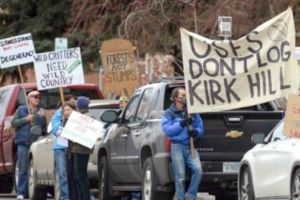 Protesting old growth logging in the |
Robert Lundahl:
Well I remember years ago you were talking about jobs versus the environment and when I began making my film on dam removal in Washington state, we had a situation that was described as “jobs versus owls,” you know, the spotted owl in particular.
It had become a kind of symbol, and gosh that was 20 years ago, so I think from what you're saying, the framing of this argument has changed absolutely. It's not so rabid.
John Meyer:
20 years ago being an environmentalist was a bourgeois thing. Now it's not.
Now you hear farmers in rural Montana being concerned about not having water for their crops, destroying the agricultural sector. You hear about ice caps melting. You hear about towns going underwater.
I mean this is impacting humans on an individual basis every single day, so we're taking it out of the abstract, out of the “fufu” environmentalist realm and bringing it really home. Really close to people, and when it really hits home then you can't deny it.
And so this is a great opportunity for people who work in the conservation community to partner with non-traditional allies and other partners.
Robert Lundahl:
...and behind you what we're seeing looks like an old growth forest.
John Meyer:
Yep, this is old growth and it's right south of Bozeman, Montana. This in an area called Cottonwood Canyon, south Cottonwood Canyon, and all these trees that you see are slated to be logged.
So you see the one tree right here, the orange tree that is the only tree in the photo that's gonna be standing after they are finished logging.
That orange paint means don't cut the tree down. So everything that is not painted orange in this photo behind me is going to be logged in the next year.
We're in court right now asking the judge to stop this old growth timber sale because the Forest Service has not adequately addressed how this logging is going to impact or exacerbate climate change.
Robert Lundahl:
Specifically what attributes of the forest are you looking at? You mentioned that there was new information, and I know that in the court of law or in court of public opinion or journalism you know when we get new information that can often change things absolutely – is that the basis of your of your legal challenge?
John Meyer:
Yes, The National Academy of Sciences has published scientific articles saying when you log forests they might start converting to non-forests because of climate change and drought, and so if trees are not going to grow back, then you're going to further exacerbate the impacts of climate change.
Now when the US Forest Service approved of this old growth timber sale they said all the trees are going to grow back the forests are going to remain for us, but this new science says trees are not going to grow back when we log them, and so that only underscores the importance of protecting the old growth forests across the United States.
Robert Lundahl:
I've been really concerned about biomass and the monetization of biomass. Meaning, sort of scraping the forest floor to harvest species like Salal in Washington and basically any little sticks or material that they can grind up into particleboard or other products.
John Meyer:
I have not heard of that issue being highly prevalent in Montana, I haven't heard of that happening in our National Forest here in southwest Montana.
Robert Lundahl:
So what I was getting at was, okay, we're looking at trees we have one two three four, I don't know probably 20 in the frame, and one that they're going to leave, so what happens to the ecosystem?
What happens to the forest floor? What happens to the species like the Marbled Murrelet you know in the coastal areas that nest in old growth and they you poop on the forest floor and contribute to the growth of ferns and lichens, the sinking of carbon and the promotion of fungi and bacteria that create a living soil and allow the forest to thrive? And live? Because of its complexity at the soil level?
What do you see there in Montana regarding the complexity and biodiversity of old growth forests? I presume what you're talking about is when the forest is cut then there's more sunlight exposure to the forest floor and things dry out.
John Meyer:
Yeah, the trees have such a huge impact on species and for a long time. The Forest Service said, “Well, trees grow back so everything will be fine,” and when trees are not growing back that means you're losing habitat.
I grew up hunting, and I still hunt to feed my family. I deer hunt, elk hunt and if there are huge openings where trees are not growing back, you're not gonna see herds of elk hanging out in those openings. Elk like cover.
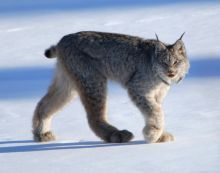 The Canada Lynx2 |
I say that because in Montana we're a relatively purple state and so hunters in many ways are practically, they spend a lot of time in the forest and they – can they have their finger on the pulse of what's going on and so if hunters say something's not right here people tend to stop and listen more than if it's a non-hunter.
Robert Lundahl:
Uh huh, academic, right.
John Meyer:
Exactly. So the logging not only impacts hunters but it also impacts non-game species like Canada Lynx in Montana.
Canada Lynx is listed as a threatened species and the Lynx are really special because they have massive paws, back paws are huge, and it allows them to travel over deep snow, and so there are virtually no other predators that can travel in deep snow in the winter.
Grizzly bears are hibernating, bobcats can't travel in deep snow because they don't have big paws, wolves aren't in deep snow, coyotes are in deep snow, I mean there's nothing else in deep snow except for Canada Lynx and their prey which is a Snowshoe Hare, so Snowshoe Hare and Canada Lynx have evolved together, with snow obviously.
It's an evolutionary adaptation that allows them to get away from other predators and that evolutionary adaptation is being lost with climate change because we're not having snow anymore, not the way we used to.
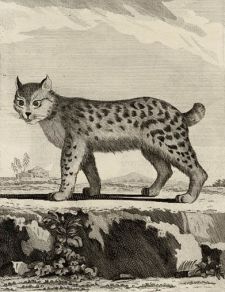 Canada Lynx illustration (mid-1700s)3 |
That's just one example of how we can see the impacts of climate change destroying, unraveling our entire ecosystem.
Robert Lundahl:
For those who say, “Well there's plenty of trees out there,” then they're not really considering the ecosystem services as a whole that an old growth forest preserves, so what is the status of this kind of logging in the state.
Is it generally supported or do we have you know like you were saying with the developers and housing, are they just, just going for it, or is there a broader perspective?
John Meyer:
Montana has traditionally been a resource extraction state, and as more and more people come to the state for outdoor recreation, we see more pushback on this sort of old school non-sustainable timber extraction.
People are coming to Montana because they want to see our wildlife, because they want to hike in our old growth forest. People are not coming to Montana for our clearcuts. And I think that a lot of our elected officials are in denial.
I mean we have a very aging white population of people in power and they're holding on to power, and they want to.
They're in denial that times are changing. Right now there are people in Montana legislature who don't believe in climate change. We have a US Senator, Steve Daines, who is in denial about climate change.
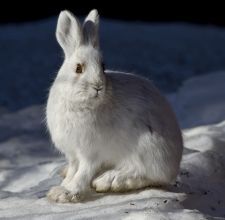 The snowshoe hare is the primary |
Robert Lundahl:
Do you hear arguments to the effect that there's a “culture” associated with extraction, you know the people have lived this way, and "my family worked in logging" let's say, for 40 years, and they want that to continue?
John Meyer:
Absolutely, and I think that’s one of our challenges. The conservation organization that I'm part of, and as the entire community, is to quickly develop alternatives to that and say, “Hey, just because your great-grandfather mined or logged or whatever doesn't mean you have to, and we're offering you an alternative opportunity, and if you don't want to take that opportunity, then sorry, I mean ‘tough,’ because it's a matter of human survival.
"We can't put the species at risk because you want to go cut down trees because your grandfather used to. You're having disproportionate impacts on human beings, and that's not okay to prop up some dying culture that is not sustainable, because we're not living in the 1800s anymore.”
I don't say that lightly because I'm the first person in my family to graduate from college.
My mom used to cut slabs of steel. She was the first female day laborer to cut steel in Northwest Indiana, and so she come home black is a piece of coal after work every day. She used to work 16-hour shifts all the time so I understand the value of hard work.
I understand the idea of blue-collar labor. But I also understand that we need to quickly adapt if we're going to survive as a species.
Robert Lundahl:
Is there a way to do sustainable logging in Montana? Is there second growth, for example, that has been planted in the past and maybe available for harvesting where this kind of damage doesn't take place?
John Meyer:
Um, yes and no.
I think that the death of the timber industry came from being too efficient. Once, you'd take a team of 20 men and horses to go and cut down trees by hand and pull them all out with horses.
Now, one guy can do the work of 10 people in a half an hour when you have machines, just wiping, mowing down forests, and that mechanized timber removal is not sustainable.
If we got people back in the woods to cut down trees, I think that's far more sustainable than what we have now with a bunch of machines just mowing everything down.
That is not sustainable, and so if we want more jobs, more timber jobs, we need to get the machines out of the woods and get humans back in there.
Robert Lundahl:
I refer to you, in one of my films, “and mechanized destruction followed” was the line and it was particularly with regard to the desert.
My mom and dad went out to the desert because it was a refuge after World War II, you know, for soldiers who were suffering from PTSD and so forth and they were settling in Los Angeles, and so there's multiple values of wild lands and you know, “mechanized destruction followed,” which I think you know, creates a trauma response from communities.
What about the tribes, how do they feel about this?
John Meyer:
The tribes have not weighed in a whole lot in the timber sales around Bozeman. We're several hours away from the National Forest land.
My sense is that the tribes are supportive of new technology, supportive of new jobs that can help address climate change, supportive of solar, wind, those sorts of industries. Tribes understand that we cannot operate the way we used to operate.
Robert Lundahl:
Is there tribal influence in that area specifically, or is there some distance between, let's say, traditional lands, and where these logging companies want to operate?
John Meyer:
Well, in Bozeman, we're on Crow land. And the Crow have been relatively vocal about protecting our water resources. They've been pretty vocal about the over consumption in southwest Montana and how that's destroying our water. They have not yet engaged in the overconsumption over extraction of timber.
Robert Lundahl:
It’d be good to go back and talk about this case a little bit because this is a separate case, and my understanding is you won and it's being challenged, is that correct?
John Meyer:
We’re still in court. This has been a 10-year battle. In 2012, Cottonwood Environmental Law Center filed an endangered species act lawsuit against the US Forest Service, saying there is new information regarding Canada Lynx, that required the Forest Service to stop logging across 12 million acres of critical habitat for Canada Lynx.
And the District Court agreed with us and said there was political interference in the designation of critical habitat for Canada Lynx.
When that came out- that a high-ranking political official interfered with the critical habitat designation, the court told the US Forest Service to go back and ensure that its management plans would protect this newly designated critical habitat.
And so we stopped timber sales, most timber sales, across 12 million acres for five or ten years. And right now the big US Senate, the Senate is talking about weakening the endangered species act in response to that case we won.
We won the case in District Court, the Ninth Circuit affirmed the District Court and then the US Forest Service petitioned the US Supreme Court to rehear the case and the US Supreme Court would not re-hear the case. They said the District Court and the Ninth Circuit all got it right.
So we won the case in the court of law, but we're learning that the court of law is not enough. You have to win the court of public opinion.
The US Senators have a huge microphone and we're really trying to educate the public about the importance of protecting our National Forest, protecting old growth, not only for endangered species but also for human beings, because we all rely on National Forests for clean healthy air and climate.
Robert Lundahl:
Well, we're symbiotic too you know, with the trees. We breathe out carbon dioxide, you know, which is useful to trees and conversely you know, they're providing oxygen you know for our expanding cities and our quality of life and health.
Do you have a pollution, air pollution problem in Bozeman now because of the popularity?
John Meyer:
No, that's not terrible. What we traditionally see is wildfires being really bad, and so the US Forest Service uses fear as a way to push through these timber sales.
Fear is a very powerful motivator for people to act and so the US Forest Service says we need to log these forests because if we don't, wildfire is going to make everything terrible and people say, “okay okay.”
But in reality the science says that the chance of a fire running into one of these logged areas is about one percent, so we're cutting down all these trees, we're losing all this carbon, the trees are not growing back and the chance of that timber sale actually mitigating against fire is relatively small and so it's again a matter of trying to educate the public, and educate the elected officials.
Robert Lundahl:
So it's a bad “trade-off.”
John Meyer:
Absolutely. You're trading off something sustainable for supposed fire resistance, which is not true, or may not be true and then the destruction of the ecosystem as a whole you know removes all of the benefits that nature provides.
Robert Lundahl:
Yeah, so that's a bad deal for people.
John Meyer:
It is a terrible deal for people and there are people who live right on the edge of these National Forests that are going to be impacted, and they do not want the timber sales and the Forest Service is not listening to these homeowners the Forest Service is not listening to the scientists. We just need the federal government to listen to the scientists. We need our elected officials to listen to the scientists.
Democracy typically responds to issues slowly, and that is where litigation comes in because we don't have to get a majority of the US Senate to agree with us that climate change is a huge issue and we need to protect old growth immediately.
We have a small organization we can file lawsuits and protect those areas and that's what we're trying to do is start this major community dialogue, national dialogue, about the importance of protecting old growth right now.
We can't wait for Joe Manchin to get educated on the impacts of protecting old growth forests, we need we need to operate quickly and efficiently, and we cannot do that with US Senators who are beholden to special interests.
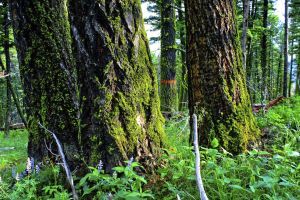 All of the trees in this photo that are not painted |
Robert Lundahl:
Well, I'm just blown away because Cottonwood is small, you're the Executive Director, there's not a whole lot of layers of management here. So what does that feel like when you're kind of like the tip of the spear?
And like you said, you're a hunter, you live there, you know what labor is and how people have always worked the land and these kinds of things, so this seems like a big responsibility for you personally and for Cottonwood Environmental Law Center to step up and take the heat.
Do you just have any thoughts on that what would you say to inspire other young attorneys or people that may be interested in following in your footsteps?
John Meyer:
Follow your heart. Your head will follow. Don't over-think it.
Yeah, do what's right in your heart and things always work out.
Robert Lundahl:
So what do you think is going to happen with your Senatorial opposition, you know, to the good work you've done here with the timber sales?
John Meyer:
There's one Democratic Senator in Montana. His name is John Tester.
Right now Senator Tester is in favor of weakening the Endangered Species Act, and I decided if we can flip Senator Tester, uh, we can protect the Endangered Species Act and really start moving forward in terms of addressing climate change.
Robert Lundahl:
Then that gets to my next question – so if other individuals in let's say, Oregon where we're going to publish this interview, what can they do to help you?
John Meyer:
Individual citizens in Oregon can reach out to their US Senators, their elected officials, and tell their elected officials that we need to protect old growth in all National Forests, not just Oregon, not just Montana, we need to protect ALL old growth across the
entire United States and that's one thing that every US Senator should understand.
Robert Lundahl:
So with regard to current legislation and you know the bill just passed - the climate change bill just passed – dc, any hopeful aspects of that? We were talking before about Build Back Better and stimulating awareness and development of solar and wind, so is there any movement there on the new bill that might be of support?
John Meyer:
I haven't looked at it very closely in terms of um protecting our overall forests. I think it's great that we're trying to transition away from some of the non-sustainable energy that we have currently, however building solar, building wind, that takes a bunch of resources and one easy way for us to address climate change is to protect oil growth.
It doesn't cost money to protect old growth. Logging costs taxpayers money. All these old growth timber sales are taxpayer subsidized, so if we want to save money and we want to address climate change, stop the old growth logging, protect old growth.
That's the easiest, fastest, most effective way to address climate change: protect our National Forests & we fight climate change. It's really simple, we don't need to over-think it.
We don't need to invest a bunch of money. We can save a bunch of money and protect our natural resources and ultimately that is going to not only save money but make money for all the states because again people are coming to Montana, Oregon, Idaho, the Pacific Northwest, for our natural resources, for our old growth forest, they're not coming to see clear cuts.
They want to see what's left of the natural world, and we have it, and we need to protect it.
Robert Lundahl:
Is there anything else that I haven't asked you that you'd like to explain or make better understood to audiences?
John Meyer:
Climate change is the most existential threat facing humanity and we need to address that as a community, as a society, as a world. We can do that by protecting our old growth forest.
You can do that by talking to your elected officials and demanding as they take action to protect our trees, because if we protect the trees, the trees are going to protect us.
Robert Lundahl:
What are the subsidies for the logging industry that you're referring to?
John Meyer:
Yeah so the Forest Service will pay the loggers to build roads. I mean these timber sales are money losers. For how much it cost the Forest Service to administer a timber sale, they never make that money back.
We lose that money, and that doesn't include the cost of loss of ecosystem services.
We need to maybe monetize the value, the economic value of how old growth trees are sequestering carbon. Carbon mitigating against climate change that analysis is never analyzed or calculated in the economic analysis when to start and talk about how that is a money loser for the American public.
You punch in the roads, and those logging roads dump a bunch of sediment in the rivers, and that sediment clogs and chokes the river. You lose all the oxygen in the river. Fish can't lay eggs. Fish can't breathe. You lose fish species, and all these logged out areas, I mean that's a money loser every time.
There's no logging project that's an economic winner for the public.
Robert Lundahl:
It's just a bad raw deal for the public on the whole so the impacts are beyond belief... it's like missing the forest for the trees absolutely.
John Meyer:
Logging old growth forests, logging these trees behind me in Montana, is going to impact everybody across the entire world- Oregon, Montana, everywhere.
It's really important that we protect what we have left- everywhere.
Join Cottonwood Environmental Law Center, to support clean water and old growth forests in Montana and beyond.
PHOTO CREDITS:
- 1Attorney John Meyer, Executive Director, Cottonwood Environmental Law Center; courtesy: Author
2Canada Lynx; courtesy: kdee64 (Keith Williams) - Flickr
3Illustration of a Canadian Lynx made around mid-18th century; courtesy: Unknown author (recherche-collection)
4The snowshoe hare is the primary prey of the Canada Lynx; courtesy: NPS Photo/Jacob W. Frank
5Video Credit: Cottonwood Environmental Law Center, www.cottonwoodlaw.org
6All of the trees in this photo that are not painted orange will be cut down as part of the Bozeman Municipal Watershed project. Cottonwood is working to stop this old growth logging. Courtesy: Cottonwood Environmental Law Center, www.cottonwoodlaw.org
7Golf course at Spanish Peaks Mountain Club resort. Courtesy: www.golfingmontana.com
8December 13, 2021: Cottonwood and other groups protested the Forest Service’s old growth logging in the Greater Yellowstone Ecosystem. Courtesy: Cottonwood
 Attorney John Meyer, founder and Executive Director of Cottonwood. John received an undergraduate degree in biology and Spanish from the University of Montana before working as a seasonal biologist for the Flathead and Tongass National Forests. John graduated with honors from Vermont Law School in 2009.
Attorney John Meyer, founder and Executive Director of Cottonwood. John received an undergraduate degree in biology and Spanish from the University of Montana before working as a seasonal biologist for the Flathead and Tongass National Forests. John graduated with honors from Vermont Law School in 2009.
After graduation, John lived in his yurt without running water or electricity in southwest Montana for more than five years to get Cottonwood Environmental Law Center started. He practices law because he wants his sons to have the opportunity to hunt wild bison on public lands and ski on glaciers in Montana.
Articles for August 18, 2022 | Articles for August 19, 2022 | Articles for August 20, 2022



googlec507860f6901db00.html


Terms of Service | Privacy Policy
All comments and messages are approved by people and self promotional links or unacceptable comments are denied.
An actual scientist March 20, 2024 8:32 pm (Pacific time)
I am sorry, but I had to laugh most of the way through this article. Much of my career as a biologist has been working in watershed ecology. The photos used in this story to represent old growth are actually second growth fir. So right off the bat you are misrepresenting what an old growth forest is. I am all for protecting old growth, but purposefully misleading readers is not acceptable. The author should have known better. Further, elk do not forage in dense stands of timber unless they are pushed out of their prime open habitat. Articles like this are actual damaging our forests via misrepresentation of the habitat in question. What we should be discussing is the major impact on forest fires due to lack of forest thinning across much of the west. Ask any qualified forest ecologist about forest health and they will agree. There are many out of the way national forests that have been safe from massive fires because the scientists are able to manage the fire and forest ecology without the interference of environmentalists. It is time for the science to be believed instead of the very untrustworthy environmentalists.
[Return to Top]©2026 Salem-News.com. All opinions expressed in this article are those of the author and do not necessarily reflect those of Salem-News.com.